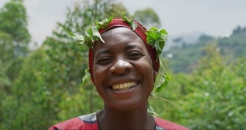 Developing a growth mindset for farmers in Africa
Developing a growth mindset for farmers in Africa
From an article by Next Billion
Traditionally, agricultural development in sub-Saharan Africa has centred on training farmers and providing them with inputs, such as seeds, fertilizer and pesticides. In recent years, technologies have been introduced to smallholders to improve their farming practices, ranging from solar-powered dehydrators that preserve crops, to mobile apps that track pests and diseases. Yet despite these efforts to foster a “green revolution,” many farmers across the region have yet to experience the anticipated benefits.
This leads us to an important question: "What key element are social enterprise and development sector practitioners potentially neglecting in our approach to agricultural development?"
The answer to that question goes beyond the usual discussion of farming technologies, inputs and practices. As most global business leaders and traditional job-holders know, a person’s mindset plays a vital role in their professional success. We’ve all seen how our individual grit, determination, resilience, persistence and creativity can make or break our ability to get a job, build a career, or launch and sustain a successful enterprise. Yet when it comes to rural farmers in frontier and emerging markets, mindset development is often overlooked.
Farming in sub-Saharan Africa remains subsistence-based, meaning that many farmers have no other means to earn a living. They rely on the weather to grow enough food to sustain themselves throughout the year, seeing their farms as a means of survival — not a business venture.
This deep-rooted mindset makes it difficult for small-scale farmers to view their farms as potentially profitable enterprises.
As much as good seeds, fertilizer, farming technologies, etc., are key to turning subsistence farmers into productive, resilient business owners, sometimes a significant shift in mindset is equally necessary — particularly for women. African women continue to play an essential role in agriculture, often taking on farm labour responsibilities out of necessity. Whether it’s due to the loss of a husband or the pressing need to feed their children, many women in the Global South farm to grow food for their families. Studies show that women perform up to 60% of agricultural labour in parts of Africa.
However, women farmers also face unique challenges that make it significantly harder for them to transition away from vulnerable subsistence farming. With limited formal education and lack of exposure to creative thinking and analytical reasoning, there are limits to the development of the type of mindset that could allow subsistence farmers to dream big and envision a better future for themselves and their families.
Many farmers barely earn $1/day. They would require a multi-fold increase in crop yields to take them across the World Bank threshold for extreme poverty (currently at $2.15/day).
Successful farming cooperatives have individual members who exhibit a growth mindset, a term popularized by Stanford psychologist, Carol Dweck. In her ground-breaking book, “Mindset”, Dweck contrasts two different types of mindset: a fixed mindset based on the belief that one is defined by permanent traits, vs. a growth mindset based on the belief that one’s basic qualities can be developed and expanded. She writes that “when people believe in fixed traits, they are always in danger of being measured by a failure. It can define them in a permanent way.” On the other hand, for those with a growth mindset, “failures may still hurt, but failures don’t define them. And if abilities can be expanded — if change and growth are possible — then there are still many paths to success.”
For every successful cooperative or individual female farmer with a growth mindset, there are hundreds more who are stuck. So when donor-funded programs end or government resources are unavailable, they feel helpless, assuming they are once again at the mercy of uncontrollable factors like droughts, floods or pest infestations. They perceive that they can only afford agricultural inputs or successful harvests if an NGO assists them. These NGOs — and the broader development sector — want them to be independent and to grow their farms beyond their wildest dreams. But how can they do that if we are acting as their crutch, inadvertently convincing them that we are essential to their success?
What these farmers really need is the confidence to believe they can find solutions independently. We can and must continue to provide them with new agricultural technologies, seed varieties and modern practices for increasing crop production. But we must also support the development of the mindset shifts that can enable farmer success, particularly in the face of climate change. For a woman farmer to think big and believe she can become a resilient farmer or micro-retailer, she must strengthen her problem-solving skills and have the confidence to make decisions independently.
The Harvest Fund began working with the women farmers in these cooperatives, aiming to encourage the critical thinking, self-esteem, problem-solving skills, reasoning and personal leadership that could unlock their full potential. They soon saw that more than a one-time workshop would be required, since we are attempting to undo generations of ingrained beliefs. So they began to focus on strengthening these soft skills through The Harvest Fund’s EmpowHER Academy, which allows for multiple formats of training — including on-site sessions at cooperatives’ farms and overnight retreats for cooperative leaders. These women’s progress in their work with The Harvest Fund gives them hope for a brighter future in agricultural development. They've been amazed at the signs of progress so far: They’ve seen some farmers double their incomes and others earn enough to invest in solar-powered home lighting systems.
Watch this 2 minute video:
Read the full article here.
Retweet about this article:
From an article by Next Billion, 12/02/2025